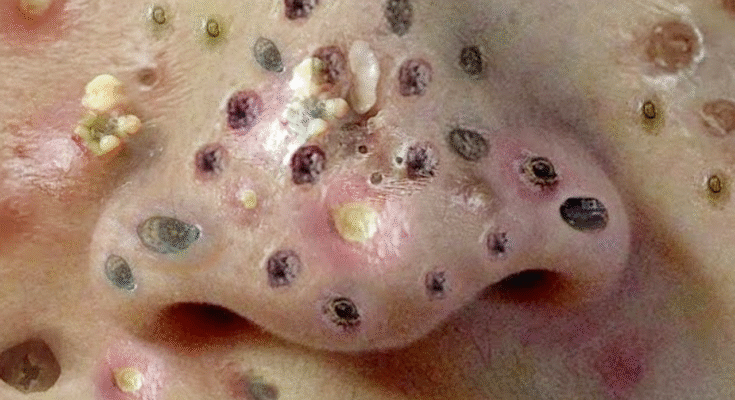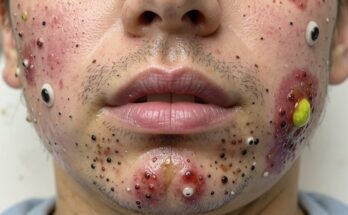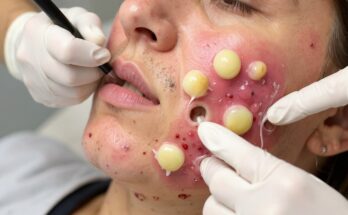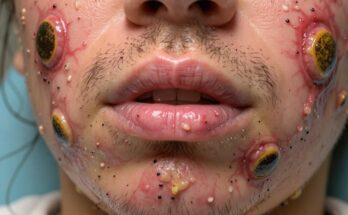Acne can feel like a never-ending battle. You try cleansers, spot treatments, serums, and maybe even medication — and still, the breakouts come back. The truth is, while skincare is essential, the secret to long-term clear skin often lies beyond the bathroom cabinet.
Acne is not just a surface problem. It’s a reflection of deeper factors — hormones, stress, sleep, diet, and even your daily habits. And while there’s no instant cure, the right lifestyle changes can make a world of difference in calming inflammation, regulating oil production, and preventing breakouts before they even start.
This guide explores 10 powerful, evidence-based lifestyle changes that support clear, balanced, healthy skin — from the inside out.
1. Balance Your Diet: Clear Skin Starts in the Kitchen
You’ve probably heard the saying, “You are what you eat.” When it comes to acne, that’s not far from the truth. Diet doesn’t cause acne on its own, but what you eat directly influences hormones, inflammation, and oil production.
1.1 Reduce High-Glycemic Foods
High-glycemic foods (those that spike blood sugar quickly) increase insulin levels, which trigger androgen hormones — the same hormones that stimulate oil glands.
Avoid or limit:
-
White bread, rice, and pasta
-
Sugary snacks and drinks
-
Processed breakfast cereals
-
Fried and junk food
Eat more of:
-
Whole grains (quinoa, oats, brown rice)
-
Leafy greens and colorful vegetables
-
Beans, lentils, and legumes
-
Low-sugar fruits (berries, apples)
These foods keep insulin levels stable, reducing sebum (oil) production and inflammation.
1.2 Watch Your Dairy Intake
Dairy — especially skim milk — can raise levels of IGF-1 (insulin-like growth factor) and androgens, both of which can worsen acne.
If you suspect dairy affects your skin, try a 3–4 week elimination and observe improvements.
Alternatives:
-
Unsweetened almond, oat, or soy milk
-
Coconut yogurt or lactose-free options
1.3 Eat More Omega-3 Fatty Acids
Omega-3s are powerful anti-inflammatories that balance hormones and calm acne flare-ups.
Sources:
-
Fatty fish (salmon, sardines, tuna)
-
Flaxseeds, chia seeds, walnuts
-
Supplements (fish oil, algal oil for vegetarians)
A study found that people with higher omega-3 intake experienced fewer and less severe breakouts.
1.4 Include Antioxidant-Rich Foods
Antioxidants help fight oxidative stress — one of acne’s major triggers. They reduce free radical damage that can lead to inflammation and clogged pores.
Eat more of:
-
Berries, citrus fruits, and grapes
-
Dark leafy greens (kale, spinach)
-
Green tea and matcha
-
Nuts and seeds
2. Stay Hydrated: The Simplest Skin Detox
Dehydration makes your skin dry and forces oil glands to overcompensate, leading to clogged pores and breakouts.
2.1 Drink Enough Water
Aim for 2–3 liters per day — more if you’re active or live in a hot climate.
2.2 Eat Hydrating Foods
Cucumber, watermelon, oranges, celery, and lettuce all contain high water content and essential electrolytes.
2.3 Limit Dehydrating Beverages
-
Alcohol
-
Coffee (in moderation is fine)
-
Sugary sodas and energy drinks
Pro tip: Start your day with a glass of warm water and lemon. It supports hydration and digestion — both linked to clear skin.
3. Prioritize Sleep: Let Your Skin Regenerate
Sleep is when your skin does most of its healing and repair. Poor sleep raises cortisol (the stress hormone), which increases oil production and inflammation.
3.1 Aim for 7–9 Hours Per Night
Your skin’s regeneration peaks between 10 p.m. and 2 a.m. — often called the “skin repair window.”
3.2 Create a Nighttime Routine
-
Avoid screens 1 hour before bed — blue light disrupts melatonin.
-
Keep your bedroom cool and dark.
-
Sleep on clean pillowcases (change them twice a week).
3.3 Beauty Sleep Is Real
Deep sleep increases blood flow, boosts collagen, and reduces puffiness.
Consistent rest = healthier barrier, less inflammation, and fewer breakouts.
4. Manage Stress: Calm Your Mind, Clear Your Skin
Chronic stress doesn’t just affect your mood — it wreaks havoc on your hormones.
4.1 How Stress Triggers Acne
When you’re stressed, cortisol levels rise. This:
-
Stimulates oil glands
-
Triggers inflammation
-
Slows healing and cell turnover
That’s why acne often flares up during exams, deadlines, or emotional periods.
4.2 Stress Management Techniques
-
Mindfulness meditation: 10 minutes a day can lower cortisol significantly.
-
Exercise: Releases endorphins that counteract stress hormones.
-
Breathing exercises: Try the 4-7-8 method (inhale 4 sec, hold 7, exhale 8).
-
Journaling or gratitude practice: Keeps your mind grounded.
4.3 Emotional Well-Being and Acne
Stress creates a vicious cycle — acne causes stress, which worsens acne. Breaking the loop with mental self-care can dramatically improve your skin and confidence.
5. Exercise Regularly — But Cleanse Smartly
Exercise is one of the best things you can do for your skin — as long as you maintain post-workout hygiene.
5.1 Why Exercise Helps Acne
-
Boosts circulation and oxygen delivery to skin cells.
-
Regulates hormones and insulin sensitivity.
-
Reduces stress and inflammation.
5.2 Avoid “Sweat Acne”
Sweat can trap dirt and oil in pores if not cleansed properly.
Tips:
-
Shower or cleanse your face right after working out.
-
Wear breathable, sweat-wicking fabrics.
-
Avoid heavy makeup while exercising.
-
Wipe gym equipment before use — bacteria thrive there.
Pro tip: Keep gentle cleansing wipes in your gym bag for quick clean-ups.
6. Stop Touching (or Picking) Your Face
We’ve all been there — a breakout appears, and you can’t resist touching it. But every time you do, you’re transferring bacteria and causing deeper inflammation.
6.1 Why Picking Worsens Acne
-
Pushes bacteria deeper into skin.
-
Increases risk of scarring and pigmentation.
-
Delays healing and causes new breakouts.
6.2 How to Stop the Habit
-
Keep hands busy (stress ball, fidget toy).
-
Use hydrocolloid pimple patches to block picking.
-
Identify triggers (mirror time, stress).
Pro tip: If you feel tempted, apply ice or a cold compress to reduce swelling instead of popping.
7. Build a Consistent, Gentle Skincare Routine
Lifestyle changes work best when combined with a smart skincare routine. The goal is to support your skin barrier, not strip it.
7.1 Keep It Simple
-
Cleanser: Gentle, non-stripping cleanser (salicylic acid or tea tree if oily).
-
Treatment: Retinoid, niacinamide, or benzoyl peroxide for acne control.
-
Moisturizer: Lightweight, non-comedogenic.
-
Sunscreen: Every morning, even on cloudy days.
7.2 Avoid Over-Washing
Washing more than twice daily removes protective oils and weakens your barrier.
7.3 Patch Test New Products
Introduce new actives slowly — your skin needs time to adjust.
Consistency > complexity. Stick with products for at least 8–12 weeks before judging results.
8. Keep Your Environment Clean
Sometimes, acne triggers hide in plain sight — on the things you use every day.
8.1 Pillowcases and Sheets
Your pillow absorbs oil, sweat, and skincare residue. Change pillowcases 2–3 times per week to reduce bacterial buildup.
8.2 Phones
Your phone collects more bacteria than a public restroom. Wipe it daily with alcohol-based wipes.
8.3 Makeup Brushes and Sponges
Wash weekly with gentle soap or brush cleanser. Dirty brushes = acne waiting to happen.
8.4 Towels
Use a separate towel for your face — and wash it often.
9. Support Gut Health
Your gut and skin are connected through the gut-skin axis. An unhealthy gut can lead to inflammation, hormonal imbalances, and acne flare-ups.
9.1 Add Probiotic-Rich Foods
-
Yogurt (unsweetened)
-
Kimchi, sauerkraut, miso
-
Kombucha (watch sugar content)
-
Kefir
9.2 Eat Prebiotic Fiber
Prebiotics feed healthy gut bacteria.
Include foods like:
-
Bananas, garlic, onions, asparagus
-
Whole grains and oats
9.3 Consider a Probiotic Supplement
Choose one containing Lactobacillus and Bifidobacterium strains — both shown to reduce acne severity and inflammation.
9.4 Limit Gut Disruptors
-
Processed sugar
-
Alcohol
-
Artificial sweeteners
A healthy gut = reduced inflammation and improved hormonal balance — two keys to clear skin.
10. Protect Your Skin from the Sun and Pollution
Sun exposure might temporarily “dry up” pimples, but it actually causes long-term harm — dark spots, pigmentation, and premature aging.
10.1 Sunscreen Is Non-Negotiable
-
Use a broad-spectrum SPF 30–50 daily.
-
Reapply every 2–3 hours if outdoors.
-
Choose oil-free, non-comedogenic sunscreens with zinc oxide or titanium dioxide.
10.2 Antioxidants Against Pollution
Pollution increases oxidative stress, damaging your skin barrier.
Use skincare with:
-
Vitamin C
-
Green tea extract
-
Niacinamide
These protect against free radicals and environmental stressors.
Bonus: Balance Your Hormones Naturally
Hormonal imbalance — especially excess androgens — can lead to increased oil production and cystic acne.
How to Support Hormonal Balance:
-
Maintain stable blood sugar with balanced meals.
-
Manage stress effectively.
-
Exercise regularly.
-
Sleep adequately.
-
Avoid endocrine disruptors (BPA, parabens, phthalates).
If acne persists, consult your doctor about hormonal testing or treatments like spironolactone or oral contraceptives.
Putting It All Together: Your Clear Skin Lifestyle Blueprint
| Focus Area | Action Step | Result |
|---|---|---|
| Diet | Reduce sugar and dairy; eat omega-3s | Fewer breakouts, balanced oil |
| Hydration | 2–3 liters water/day | Plumper, healthier skin |
| Sleep | 7–9 hours nightly | Reduced inflammation |
| Stress | Meditation, exercise | Lower cortisol, calmer skin |
| Exercise | 3–5 times/week | Balanced hormones |
| Hygiene | Clean pillowcases, brushes | Fewer clogged pores |
| Skincare | Simple, consistent routine | Barrier repair, clear tone |
| Gut Health | Probiotics and fiber | Less inflammation |
| Sun Protection | SPF 30–50 daily | Prevents pigmentation |
| Hormone Support | Balanced lifestyle | Long-term acne prevention |
The Bottom Line: Clear Skin Is a Lifestyle, Not a Quick Fix
Acne isn’t a reflection of bad hygiene or failure — it’s your body communicating imbalance.
While skincare is essential, your lifestyle choices are the foundation.
By fueling your body with nutritious foods, managing stress, sleeping well, and caring for your skin consistently, you’re not just reducing acne — you’re creating long-term harmony between your body and skin.
Clear skin is not about perfection.
It’s about patience, balance, and small daily habits that work together over time.



